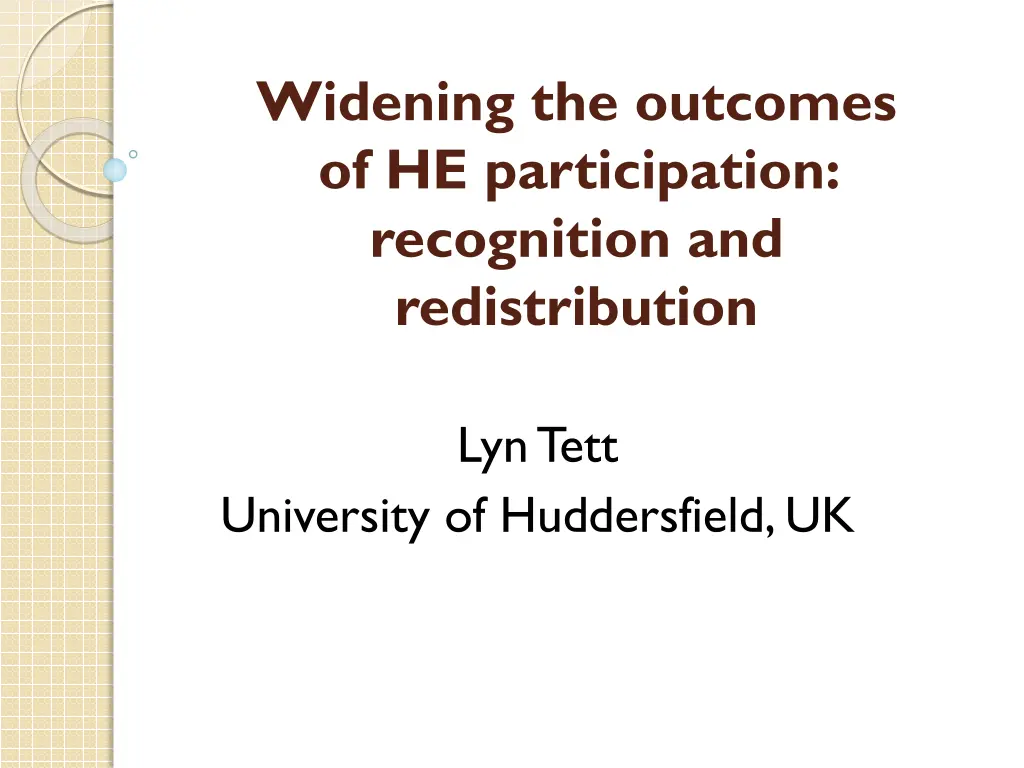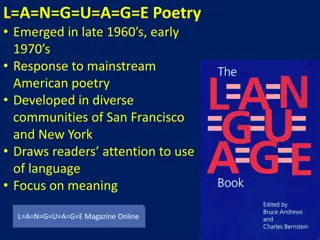
Understanding the Impact of Higher Education Participation
Explore the multifaceted outcomes of higher education participation, highlighting the importance of recognition and redistribution in achieving social justice and individual empowerment. Delve into Nancy Fraser's framework for analyzing redistributive and recognitive outcomes, shedding light on how education influences identity formation and societal structures.
Download Presentation

Please find below an Image/Link to download the presentation.
The content on the website is provided AS IS for your information and personal use only. It may not be sold, licensed, or shared on other websites without obtaining consent from the author. If you encounter any issues during the download, it is possible that the publisher has removed the file from their server.
You are allowed to download the files provided on this website for personal or commercial use, subject to the condition that they are used lawfully. All files are the property of their respective owners.
The content on the website is provided AS IS for your information and personal use only. It may not be sold, licensed, or shared on other websites without obtaining consent from the author.
E N D
Presentation Transcript
Widening the outcomes of HE participation: recognition and redistribution Lyn Tett University of Huddersfield, UK
Presentation Nancy Fraser s framework for social justice Redistributive outcomes of HE participation Recognitive outcomes of HE participation Case study findings on the wider benefits of learning Policy implications
Nancy Frasers framework Every injustice should be treated as both economic, requiring material redistribution, and cultural, requiring the recognition of people s identities and cultural diversity. Lack of recognition is a matter of social status, where ... patterns of disrespect and disesteem are institutionalized . Some groups are subjected to both types of discrimination because they are discriminated against in the labour market [whilst simultaneously]... patterns of cultural value privilege some traits .
Education and identity The injustices identified by Fraser operate at the individual level because people incorporate negative discourses about their ability to learn and come to view themselves as deficient, rather than focusing on disabling structures. So engaging in education is mediated by individual s subjectivities and learning is not only about acquiring new understandings and practices but is also about changes in people s identity.
Enabling learning Accessibility Opportunities Learning environment SOCIETY From Yusuf Sayed (2010) EFA Global Monitoring Team, UNESCO
Redistributive outcomes of HE Having a degree is a key factor in social mobility in the UK bringing greater earnings over the life course, but the earnings of graduates vary by subject, socio-economic background, race , gender and institution attended. Non-traditional students continue to be disadvantaged in the graduate labour market due to the more limited ability of this group to deploy the social and cultural capital which enables them to know the rules of the game (Bourdieu and Passeron, 1977).
Recognitive outcomes of HE Being recognised as capable of learning by significant others and by oneself results in changes in self-esteem, identity and sense of control. This leads to not only individual changes but also to inter-generational changes as the whole household benefits from having their cultural values and practices recognised and respected.
Case study design Follow up study in 2015 of non-traditional students that had entered a Russell group university in 2004. Of the original cohort of 45, 15 were interviewed by telephone and asked to reflect on their whole experience of university and the impact that their studies had had on their subsequent personal and professional lives.
The wider benefits of learning: the knowledge bug A clear finding from the interviews was the continued commitment that the participants had to learning. Almost all of them had undertaken some form of learning after they finished their degrees. The participants also outlined how the degree had led to changes in their identities and they often articulated these experiences in relation to the skills they had developed in thinking critically and reflectively. For one university opened her mind and made her start to think and question everything . Similarly another commented: I think there s been a lot of changes in my thinking over the years based on all the courses that I ve done [ ]. The course has made me more reflective in practice, work and personal .
The wider benefits of learning: changing selves Getting a degree: fills you with confidence [ ]. Apart from having a family, getting a degree is probably the best feeling in the world [ ]. it also got me thinking a bit wider and about the bigger picture Changes in their confidence and in their identities were transformative for the participants and had lasting benefits for their both their working lives and their personal circumstances. This was tied up with a new found confidence and belief in their abilities. Many commented on their ability to inspire their children: I think for [son] it certainly had a positive impact on him and to want to go there [university] and he was very proud that his mum had been to university when a lot of his friends mums hadn t .
Policy implications 1 The neo-liberal discourse of performativity focuses on what is accessible to measure so universities tend to get assessed on redistributive, rather than recognitive, outcomes. For example, the Teaching Excellence Framework (TEF)produces a narrow measure for student outcomes focused on employment: Students achieve their educational and professional goals, in particular progression to further study or highly skilled employment .
Policy implications 2 The focus is also on the individual and is about: supporting the aspirations and achievement of students from a diversity of backgrounds (TEF) rather than considering the structural impediments to employment. Yet our case study shows the importance of being recognised culturally and that this is intimately tied up with employment so that these two aspects can t be separated. In addition acquiring knowledge, skills and attributes that are valued by employers (TEF) is not the kind of life enhancing change that many students seek.
Conclusion The key problem of the current approach to audit and measurement is that it drives out what is difficult to measure and so narrows outcomes. Instead we should be more focused on recognition and respect as these often get ignored in a world dominated by a discourse that assumes that the economic is everything. So to bring about change we should focus on both redistribution and recognition as equally important outcomes of participation in HE.
References Bathmaker, A.M., N. Ingram, and R. Waller. 2013. Higher Education, Social Class and the Mobilisation of Capitals: Recognising and Playing the Game. British Journal of Sociology of Education 34 (5-6): 723-743. Brennan, J., N. Durazzi, T. S n . 2013. Things we Know and Don t Know About the Wider Benefits of Higher Education: A Review of Recent Literature. BIS Research Paper Number 133. Department for Business Innovation and Skills. Britton, J., L. Dearden, N. Shephard, and A. Vignoles. 2016. How English Domiciled Graduate Earnings Vary with Gender, Institution Attended, Subject and Socio-economic Background. IFS Working Paper No.201606 http://www.ifs.org.uk/uploads/publications/wps/wp201606.pdf Britton, J., N. Shephard, and A. Vignoles. 2015. Comparing Sample Survey Measures of English Earnings of Graduates with Administrative Data During the Great Recession. Institute for Fiscal Studies Working Paper W15/28 DOI: 10.1920/wp.ifs.2015.1528 Cabinet Office. 2011. Opening Doors, Breaking Barriers: A Strategy for Social Mobility. London: HM Government. Christie, H. V. Cree, E. Mullins & L. Tett (2017): University opened up so many doors for me : the personal and professional development of graduates from non- traditional backgrounds, Studies in Higher Education, DOI: 10.1080/03075079.2017.1294577 Social Mobility and Child Poverty Commission. 2013. Higher Education: The Fair Access Challenge, http://expandingopportunities.eu/sites/default/files/FINAL_Higher_Education_- _The_Fair_Access_Challenge.pdf
Contact details University of Huddersfield l.tett@hud.ac.uk University of Edinburgh lyn.tett@ed.ac.uk




















